Trade Secretary Cristina Roque announced on Wednesday that she will meet today with her counterparts from the Association of Southeast Asian Nations (ASEAN) to discuss a coordinated response to U.S. President Donald Trump’s newly imposed tariffs, which took effect the same day.
“We will see what consensus we can reach and how we can collaborate as ASEAN members,” Roque told reporters during the National Food Fair at SM Megamall.
Trump unveiled his latest trade policy on April 2, branding it as part of his so-called “Liberation Day.”
The new U.S. tariff on Philippine exports, effective April 9, stands at 18 percent—lower than the 34 percent levy imposed on American goods entering the Philippines. The rates for other ASEAN nations are significantly higher: Cambodia (49 percent), Vietnam (46 percent), Thailand (36 percent), Indonesia (32 percent), and Malaysia (24 percent). Singapore, however, will only face a baseline tariff of 10 percent.
Roque believes the most effective ASEAN strategy would be to engage in negotiations aimed at reducing the tariffs. At the same time, she noted the importance of identifying potential advantages for the Philippines in the current trade environment.
“For example, our dried mangoes compete with Cambodia’s, but with Cambodia facing a 49 percent tariff, we gain a competitive edge,” she said.
She also highlighted the Philippine government’s ongoing efforts to secure free trade agreements with various countries to strengthen its trade position.
“There are many potential partners—South America, the Middle East, Asia, and others—especially for high-demand products that we export,” Roque added.
ASEAN Prefers Dialogue Over Retaliation
ASEAN governments have opted not to retaliate against the U.S. but instead seek dialogue.
Finance Secretary Ralph Recto confirmed that the Philippines has no intention of retaliating against Trump’s tariffs, nor are there any immediate plans to lower tariffs on imported U.S. goods.
Meanwhile, ASEAN Secretary-General Kao Kim Hourn, speaking at an investment conference in Kuala Lumpur, emphasized the need for ASEAN to take decisive action to boost regional economic integration amid the uncertainty caused by U.S. trade policies.
“To stay relevant in an increasingly unstable global economy, we must act boldly, decisively, and together to reaffirm ASEAN’s commitment to a stable and business-friendly environment,” Kao stated.
His remarks came ahead of a meeting of ASEAN economic and finance ministers, along with central bank governors, in Kuala Lumpur to discuss their response to the tariffs.
However, ASEAN’s export-driven economies face additional risks due to China’s retaliatory tariffs against the U.S., further intensifying the global trade conflict.
“If we do not take swift and collective action to accelerate intra-ASEAN economic integration and expand our trade partnerships, we risk losing our position in a rapidly shifting global economy,” Kao warned.
While China faces a massive 104-percent tariff, other affected nations are opting for negotiations. Trump’s administration has already scheduled discussions with South Korea and Japan, two key U.S. allies, while Italian Prime Minister Giorgia Meloni is set to visit Washington next week.



